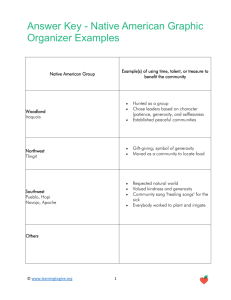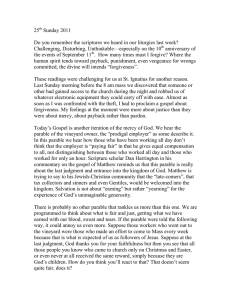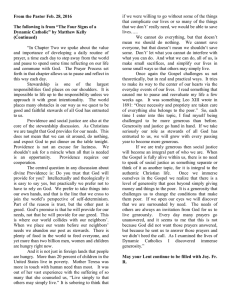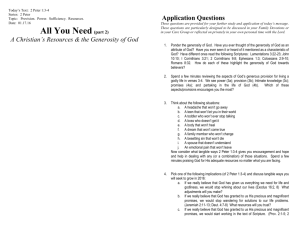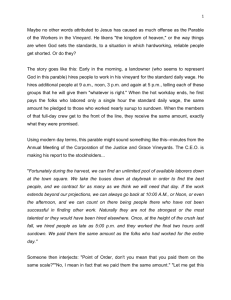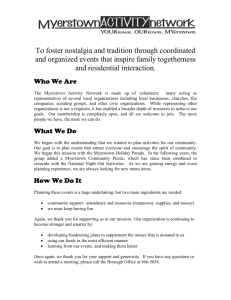25th Sunday, Year A, 2014 Is God’s Generosity Fair?
advertisement
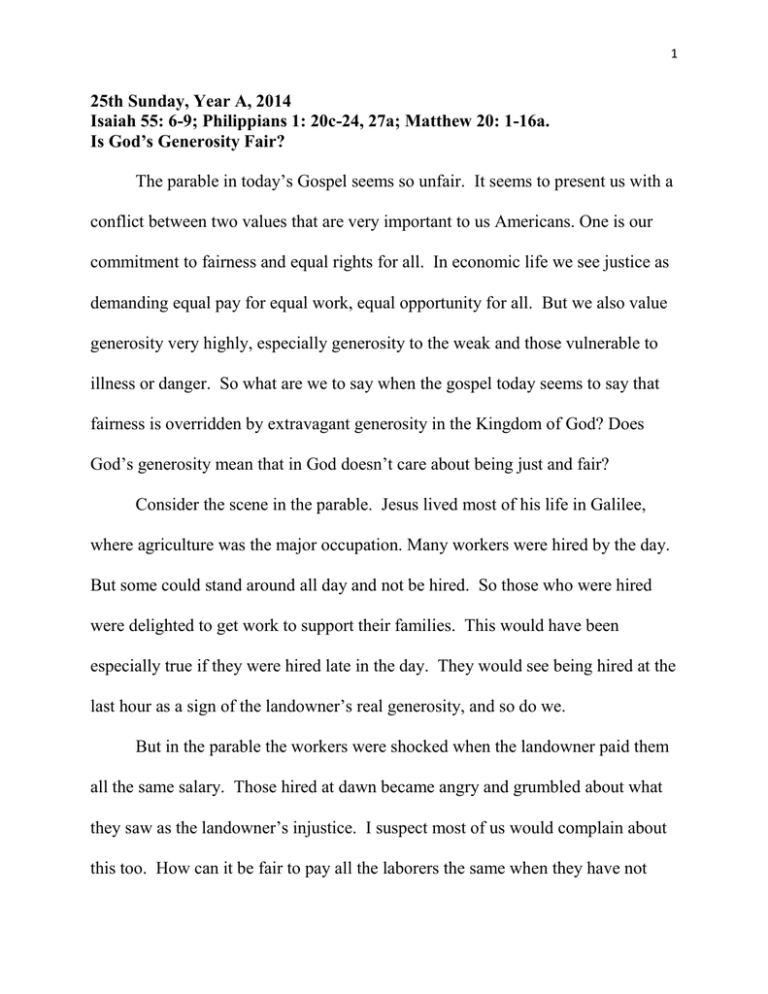
1 25th Sunday, Year A, 2014 Isaiah 55: 6-9; Philippians 1: 20c-24, 27a; Matthew 20: 1-16a. Is God’s Generosity Fair? The parable in today’s Gospel seems so unfair. It seems to present us with a conflict between two values that are very important to us Americans. One is our commitment to fairness and equal rights for all. In economic life we see justice as demanding equal pay for equal work, equal opportunity for all. But we also value generosity very highly, especially generosity to the weak and those vulnerable to illness or danger. So what are we to say when the gospel today seems to say that fairness is overridden by extravagant generosity in the Kingdom of God? Does God’s generosity mean that in God doesn’t care about being just and fair? Consider the scene in the parable. Jesus lived most of his life in Galilee, where agriculture was the major occupation. Many workers were hired by the day. But some could stand around all day and not be hired. So those who were hired were delighted to get work to support their families. This would have been especially true if they were hired late in the day. They would see being hired at the last hour as a sign of the landowner’s real generosity, and so do we. But in the parable the workers were shocked when the landowner paid them all the same salary. Those hired at dawn became angry and grumbled about what they saw as the landowner’s injustice. I suspect most of us would complain about this too. How can it be fair to pay all the laborers the same when they have not 2 worked the same amount of time? The owner defends himself by reminding the grumblers that he has given them what they agreed to—“the usual daily wage” and “what is just.” He ends the controversy with a question intended to silence the grumblers: “Are you envious because I am generous?” (Mt 20:15). We find this parable disturbing because we so readily identify ourselves with those who “who bore the whole day’s burden and the heat.” We surely want God to be generous with all. But don’t we expect God’s generosity to be proportionate to our efforts, or our achievement, or our virtue? But Jesus is telling us that God doesn’t operate according to the standard that most of us might follow. God’s generosity and love is not proportionate to our effort or achievement. According to human standards, God’s generosity is way beyond fairness. Perhaps we should understand the parable in light of the last lines of today’s reading from the prophet Isaiah: As high as the heavens are above the earth, so high are my ways above your ways and my thoughts above your thoughts. The way God cares for us is beyond calculation. It is just, to be sure. But it is much more generous than any treatment that can be measured in terms of justice. God’s care for us is rooted in extravagant generosity, a form of love and mercy that goes beyond anything we deserve. This is a teaching that will at first humble us, for it tells us that we shouldn’t try to calculate our worth in the eyes of God. If we 3 calculate with God, then God will calculate with us. And if you are like me, having God calculate how much I am worth is not a very encouraging prospect. No, Jesus tells us, our worth depends entirely on God’s extravagant generosity. This can be truly comforting; it frees us from the burden of having to earn God’s love. Whether we begin to serve God early or late, we can always be of good heart. We can say to God: Thank you, God, for being a God of mercy and consolation to us who are such poor sinners and unprofitable servants. Thank you for being a God who loves me in a way I could never earn by my own effort. As the great theologian Karl Rahner once wrote, today’s parable tells us that all we are and have, even the painful and mysterious, is God’s generous gift. The parable calls me to thank God for making me just as I am, with my abilities, my temperament, my family, my limitations and all the rest that I cannot change. We are being invited to accept this gift—the gift of our very selves just as we are, and just as God does. And when we accept ourselves as truly God’s own gift, God gives us an even greater gift: God’s own self. When God gives God’s very self, we receive the most extravagant gift of all—an overflowing love that goes way beyond anything due to us in fairness. So along with the workers hired at the end of the day, let us now thank God around the table of the Eucharist for this amazingly generous gift. David Hollenbach, S.J. St. Ignatius Church September 21, 2014
